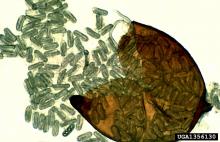The future threat of PCN in Scotland

Potato cyst nematode (PCN) remains an important threat to potato production in the UK as elsewhere and is a particular concern to the Scottish seed industry, since land found to be infested with the pest cannot be used to grow seed. However, ware crops can still be grown which may exacerbate issues for the seed potato industry. While there is good cultivar resistance (ca 50% of potatoes in Scotland) to species Globodera rostochiensis, helping to halt its spread, there is little resistance to a second species (G. pallida), which has a greater potential to increase and spread. This is likely to have a detrimental effect on the seed industry in Scotland in the future but how much of an effect is not clear. This project is divided into four parts to help better understand the threat from PCN in the future:
• A review of possible interventions to include a review of PCN management in other countries to inform the work packages below:-
• Modelling future risks of both G. rostochiensis and G. palida using interventions identified in the review and climate scenarios.
• Grower behaviours and attitudes to interventions, to include input from industry stakeholders.
• An economic analysis of likely impact in Scotland based on a range of possible interventions.
Impact: A clearer understanding of possible control options, economic impacts of available interventions and the likelihood of growers and buyers adopting new resistant varieties, altering rotation practices or any other interventions such that recommendations on best strategies (including statutory controls) can be made.
• A review of possible interventions to include a review of PCN management in other countries to inform the work packages below:-
• Modelling future risks of both G. rostochiensis and G. palida using interventions identified in the review and climate scenarios.
• Grower behaviours and attitudes to interventions, to include input from industry stakeholders.
• An economic analysis of likely impact in Scotland based on a range of possible interventions.
Impact: A clearer understanding of possible control options, economic impacts of available interventions and the likelihood of growers and buyers adopting new resistant varieties, altering rotation practices or any other interventions such that recommendations on best strategies (including statutory controls) can be made.
Position:
Mathematical and Statistical Modeller
Institution: Biomathematics and Statistics Scotland
